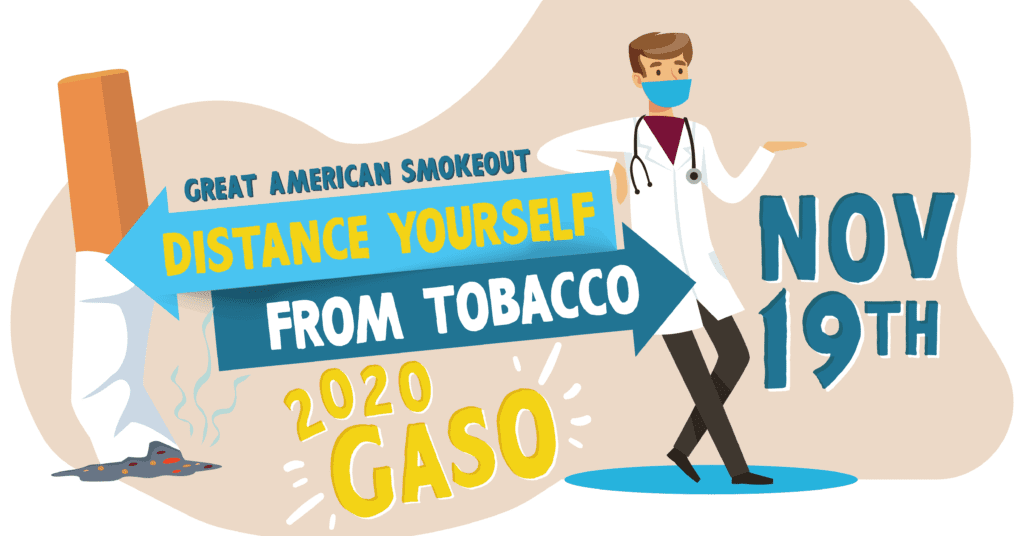Riverbend Announces Upcoming Tobacco & Nicotine-Free Facilities Policy

Today is The Great American Smokeout, the day dedicated to encouraging people to become tobacco and nicotine-free. At Riverbend, we are using this day as the launching point for our new Tobacco and Nicotine-Free Facility Policy.
The policy will ban the use of all tobacco and nicotine products (excluding nicotine-containing smoking cessation aids) within all properties owned, leased, or occupied by Riverbend. This includes parking lots, vehicles parked on the premises, as well as surrounding green space. The policy will go into effect at several sites on January 4th, 2021 and will be rolled out across all programs by March 1st, 2021.
Through implementing this policy, our goal is to provide a healthy and safe environment for employees, clients, and visitors and to promote positive health behaviors. While we know this may not be easy, it is central to continuing Riverbend’s mission of caring for the behavioral health of the community.
If you have been considering quitting, now is a good time to quit! Talk to your primary care provider or behavioral health team about medication and other support options. You might also visit quitnownh.org or call 1-800-QUIT-NOW to be connected to a Quit Coach, medication, and other help.
The following should answer common questions about our tobacco and nicotine-free policy. If you have questions or concerns, please email us at development@riverbendcmhc.org.
Why did we do this?
As behavioral health providers we are committed to maintaining a healthy environment for those we treat and to promoting healthy behaviors. Eliminating exposure to second hand smoke is one step further towards this goal.
What does it mean to be nicotine and tobacco-free?
This means all nicotine and tobacco products (other than nicotine-containing smoking cessation aids) are prohibited in Riverbend facilities and on its properties. This includes cigars, cigarettes, pipe smoking, smokeless (chewing) tobacco, e-cigarettes, vapor nicotine products and all other tobacco products.
Don’t we have a right to smoke?
There is no legal right to smoke or use vapor products. On the other hand, companies have a right to create a tobacco-free environment within their properties and facilities. This initiative is consistent with our goals of supporting good health and wellness.
Can I use tobacco or nicotine products inside my car?
If your car is parked in a Riverbend owned or leased parking lot, you cannot smoke or use tobacco or nicotine products because the lot is part of our tobacco-free zone.
Can I use tobacco or nicotine products on the public sidewalk?
Our policy is specific to Riverbend owned or leased property and does not include public sidewalks or other areas. As good neighbors, we ask that both staff and clients are respectful of the adjoining areas and do not litter.
How will clients and staff who use tobacco and nicotine get help?
Clients will be screened for tobacco use at intake and throughout treatment so that their treatment team is able to help them access services without usage. If desired, this might support accessing tobacco and nicotine alternatives. Both clients and staff will be offered resources to assist them with complying with this tobacco and nicotine-free facility policy.
Can clients go off campus to smoke or use other tobacco and nicotine products?
Clients are expected to remain on campus for the duration of their appointment, including groups. If they need support to comply with this policy, they should discuss this with a member of their treatment team.
Why shouldn’t smokers continue to be allowed to smoke in designated areas?
Secondhand smoke contributes to respiratory infections, asthma, bronchitis, and pneumonia. There are many people who walk through the doors and parking lots to all Riverbend facilities and have been breathing in smoke. We need to provide a clean and safe environment for people visiting the Riverbend facilities. Eliminating tobacco use on our campuses also supports those who are trying to quit by reducing the triggers that make quitting tobacco difficult.
